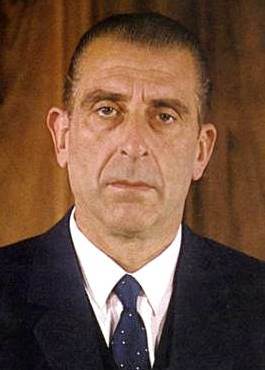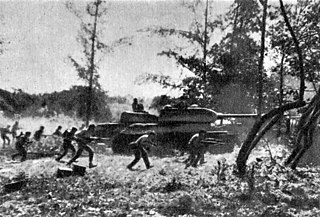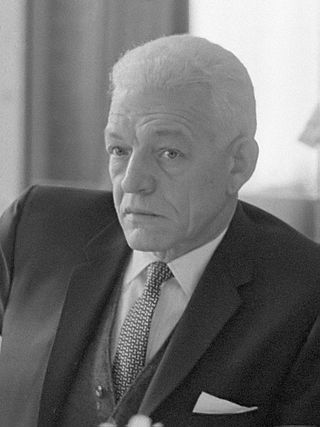Notes
- ↑ Michael B. Salwen, Bruce Garrison (2013). "Latin American Journalism". Routledge Communication Series, pages 90-91
- ↑ Juan Gargurevich (1981). "A golpe de titular: CIA y periodismo en América Latina". page 33."
LATIN (always referenced in upper case) was a cooperation scheme among 13 newspapers in Latin America which was organized by Reuters and lasted from 1970 until 1981. [1] It was not a news agency per se, but rather a permanent exchange mechanism. In 1975, The New York Times revealed that LATIN was used by the CIA to in covert operations of counterinformation and influencing public opinion in Latin America. [2]
Today,[ when? ] similar schemes are carried through the Periódicos Asociados Latinoamericanos and Grupo de Diarios América.

Salvador Guillermo Allende Gossens was a Chilean physician and socialist politician who served as the 28th president of Chile from 3 November 1970 until his death on 11 September 1973. He was the first Marxist to be elected president in a liberal democracy in Latin America.
The term Hispanic refers to people, cultures, or countries related to Spain, the Spanish language, or Hispanidad.

Eduardo Nicanor Frei Montalva was a Chilean political leader. In his long political career, he was Minister of Public Works, president of his Christian Democratic Party, senator, President of the Senate, and the 27th president of Chile from 1964 to 1970. His eldest son, Eduardo Frei Ruiz-Tagle, also became president of Chile (1994–2000).

The Bay of Pigs Invasion was a failed military landing operation on the southwestern coast of Cuba in 1961 by Cuban exiles, covertly financed and directed by the United States. It was aimed at overthrowing Fidel Castro's communist government. The operation took place at the height of the Cold War, and its failure influenced relations between Cuba, the United States, and the Soviet Union.

Operation Condor was a United States–backed campaign of political repression and state terror involving intelligence operations, CIA–backed coup d'états, and assassinations of left-wing socialist leaders in Latin and South America from 1968–1989. Highly publicized events such as the assassination of Cuban revolutionary Che Guevara by CIA–backed Bolivian forces in October 1967 have been perceived as catalysts that predated the operation. Operation Condor was officially and formally implemented in November 1975 by the right-wing dictatorships of the Southern Cone of South America.

The Good Neighbor policy was the foreign policy of the administration of United States President Franklin Roosevelt towards Latin America. Although the policy was implemented by the Roosevelt administration, President Woodrow Wilson had previously used the term, but subsequently went on to justify U.S. involvement in the Mexican Revolution and occupation of Haiti. Senator Henry Clay had coined the term Good Neighbor in the previous century. President Herbert Hoover turned against interventionism and developed policies that Roosevelt perfected.

Juan Emilio Bosch Gaviño was a Dominican politician, historian, writer, essayist, educator, and the first democratically-elected president of the Dominican Republic for a brief time in 1963. Previously, he had been the leader of the Dominican opposition in exile to the dictatorial regime of Rafael Trujillo for over 25 years. To this day, he is remembered as an honest politician and regarded as one of the most prominent writers in Dominican literature. He founded both the Dominican Revolutionary Party (PRD) in 1939 and the Dominican Liberation Party (PLD) in 1973.

José María Hipólito Figueres Ferrer served as President of Costa Rica on three occasions: 1948–1949, 1953–1958 and 1970–1974. During his first term in office he abolished the country's army, nationalized its banking sector, and granted women and Afro-Costa Ricans the right to vote, as well as access to Costa Rican nationality to people of African descent.
Afro–Latin Americans or Black Latin Americans are Latin Americans of full or mainly sub-Saharan African ancestry.
Lusitanic is a term used to refer to people who share the linguistic and cultural traditions of the Portuguese-speaking nations, territories, and populations, including Portugal, Brazil, Madeira, Macau, Timor-Leste, Azores, Angola, Mozambique, Cape Verde, São Tomé and Príncipe, Guinea Bissau and others, as well as the Portuguese diaspora generally.

Philip Burnett Franklin Agee was a Central Intelligence Agency (CIA) case officer and writer of the 1975 book, Inside the Company: CIA Diary, detailing his experiences in the CIA. Agee joined the CIA in 1957, and over the following decade had postings in Washington, D.C., Ecuador, Uruguay and Mexico. After resigning from the Agency in 1968, he became a leading opponent of CIA practices. A co-founder of the CounterSpy and CovertAction series of periodicals, he died in Cuba in January 2008.

The Cuban Project, also known as Operation Mongoose, was an extensive campaign of terrorist attacks against civilians and covert operations carried out by the U.S. Central Intelligence Agency in Cuba. It was officially authorized on November 30, 1961 by U.S. President John F. Kennedy. The name Operation Mongoose had been agreed at a prior White House meeting on November 4, 1961. The operation was run out of JM/WAVE, a major secret United States covert operations and intelligence gathering station established a year earlier in Miami, Florida. It was led by United States Air Force General Edward Lansdale on the military side and William King Harvey at the CIA and went into effect after the failed Bay of Pigs Invasion.

The National Reorganization Process was the military dictatorship that ruled Argentina from 1976 to 1983, which received support from the United States until 1982. In Argentina it is often known simply as última junta militar, última dictadura militar or última dictadura cívico-militar, because there have been several in the country's history and no others since it ended.
The Escambray rebellion was an armed conflict from 1959 to 1965 in the Escambray Mountains during which several insurgent groups fought against the Cuban government led by Fidel Castro. The military operation against the rebellion was called the Struggle Against Bandits by the Cuban government.
The Central American crisis began in the late 1970s, when major civil wars and communist revolutions erupted in various countries in Central America, causing it to become the world's most volatile region in terms of socioeconomic change. In particular, the United States feared that victories by communist forces would cause South America to become isolated from the United States if the governments of the Central American countries were overthrown and pro-Soviet communist governments were installed in their place. During these civil wars, the United States pursued its interests by supporting right-wing governments, who were supported by the elite classes, against left-wing guerrillas, who were supported by the peasant and working class.
Operation Charly, was allegedly the code-name given to a program during the 1970s and 1980s undertaken by the junta in Argentina with the objective of providing military and counterinsurgency assistance to right-wing dictatorships and insurgents in Central America. According to Noam Chomsky, the operation was either headed by the Argentine military with the agreement of the United States Department of Defense, or was led by the US and used the Argentinians as a proxy.
The U.S. Central Intelligence Agency deals with activities related to human survival issues, emphasizing disease and basic needs such as water and agriculture as a part of its function across the world.
The U.S. Central Intelligence Agency (CIA) has a sordid history of intervention over many decades in Guatemala, a country in Central America. Guatemala is bordered by the North Pacific Ocean and the Gulf of Honduras. The four bordering countries are Mexico, El Salvador, Honduras and Belize. Due to the proximity of Guatemala to the United States, the fear of the Soviet Union creating a beachhead in Guatemala created panic in the United States government during the Cold War. The CIA undertook Operation PBSuccess to overthrow the democratically elected Jacobo Árbenz in the 1954 Guatemalan coup d'état. Carlos Castillo Armas replaced him as a military dictator. Guatemala was subsequently ruled by a series of military dictatorships for decades. Between 1962 and 1996, Left-wing guerrillas fought the U.S. backed military governments during the Guatemalan Civil War.

The Romance-speaking world, Romanophone world, Neolatin world, or Latin-speaking world, is the part of the world where Romance languages are either official, co-official, or significantly used, comprising Latin Europe and Latin America, as well as parts of North America and Romance-speaking Africa and Romance-speaking Asia.

Participation of the United States in regime change in Latin America involved US-backed coups d'état aimed at replacing left-wing leaders with right-wing leaders, military juntas, or authoritarian regimes. Lesser intervention of economic and military variety was prevalent during the Cold War in line with the Truman Doctrine of containment, but regime change involvement would increase after the drafting of NSC 68 which advocated for more aggressive combating of potential Soviet allies.